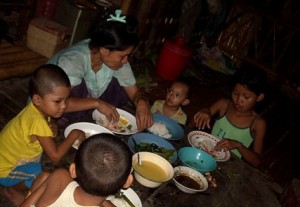A reduction in funding from international donors will see many of the tens of thousands of refugees living on the Thai Burma border getting less food to eat.
In a media statement released on the 18 September, The Border Consortium, who is responsible for the delivery of humanitarian aid to the 129,787 refugees from Burma now living in Thailand, said.
 “Rice rations are being revised in refugee camps in Thailand following reductions in funding for humanitarian food aid and a transition to needs-based and community-managed humanitarian relief.”
“Rice rations are being revised in refugee camps in Thailand following reductions in funding for humanitarian food aid and a transition to needs-based and community-managed humanitarian relief.”
The TBC said the reduction in rations would start from December and would be based on household needs. Ms Sally Thompson, TBC’s executive director said
“In order to ensure that the community’s basic needs are met, TBC is continuing to maintain a standard monthly ration while introducing four staged levels of assistance, Ms Thompson added that, “People who are in need of extra assistance may receive an increase in their rations.”
The TBC media statement pointed out that the standard ration of rice that is now12 kg per month for adults will be “…changed to 8, 10, or 12 kg, depending on camp vulnerability/need.”
Refugees who spoke to Karen News stressed that this is the second time in the last two years that their rations have been cut. Naw Htoo, a mother of five from Umpiem Camp said.
“We used to get 15kg in 2011. It was dropped to 13kg and now it will be cut to 12kg. We can manage on the rice but we lack other food like meat and vegetables. As we have a big family the amount of charcoal we get for our fires is not enough even for cooking.”
The TBC said that camp residents rice supplies are also supplemented with “yellow split peas, vegetable oil, vitamin and mineral-fortified flour, fishpaste, iodized salt and charcoal, none of which are affected by these changes.”
The TBC said the “responsibility of managing the ration changes has been handed over to the community.”
Refugees told Karen News that giving responsibility to the community is a positive move as they “know which families can cope with limited rations and which families will need help.”
Ms Thompson, TBC’s executive director said that, “the community [will gain] more experience in managing their food supply, TBC is also introducing Community-Managed Targeting. This means that the camp community, not TBC, will determine which level of assistance each household qualifies for.”
TBC has said households will be “categorised by community committees as ‘Most Vulnerable,’ ‘Vulnerable,’ ‘Standard,’ and ‘Self Reliant’. Households categorised as ‘Most Vulnerable’ will receive an increase in rations, ‘Vulnerable’ households will maintain their current level of assistance, ‘Standard’ will see a change in the rice provided for adults, and ‘Self Reliant’ households will no longer receive food assistance for adults over 18 years old.”
Refugees interviewed for this story said that two years of ration cuts, top level meetings among Thai authorities and Burma government officials on going peace talks between the Karen national Union and the Burma government has contributed to raising anxiety levels among camp residents about an early and ill-planned repatriation.
Ms Thompson in her statement said the there is universal recognition that conditions in Burma are not yet ready for repatriation.
“It is important to note that, currently, the refugee community, the Royal Thai Government, the Government of the Republic of the Union of Myanmar and UNHCR all agree that conditions do not yet exist for an organised return. Ration changes are not intended to promote an early return to Burma/Myanmar.”



